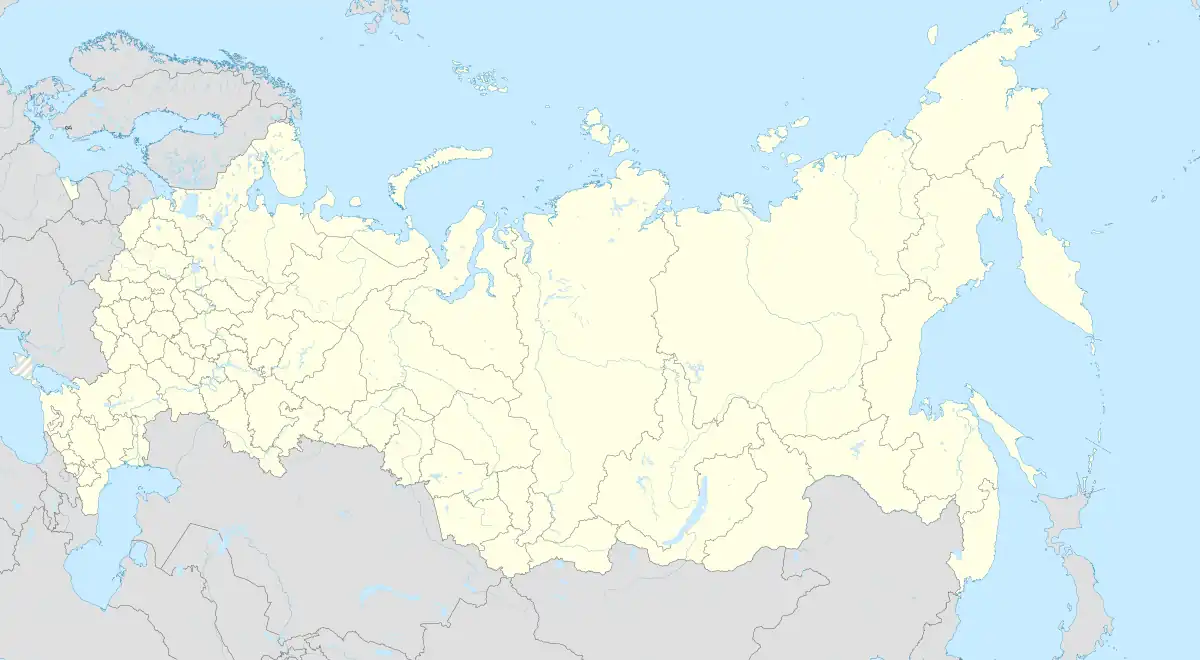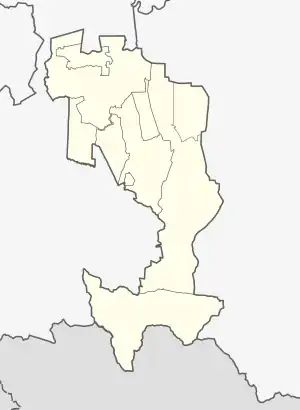Tyarsh
Tyarsh[8] or Tarsh[9][lower-alpha 2] (Ingush: ТIаьрш, romanized: Thärsh[lower-alpha 1]), is an aul in the Dzheyrakhsky District of Ingushetia. It is part of the rural settlement of Olgeti (administrative center rural settlement). Tyarsh is the ancestral aul of Ingush teip Torshkhoy (Ingush: ТIоаршхой).[10]
Tyarsh
Тярш | |
|---|---|
| Other transcription(s) | |
| • Ingush | ТIаьрш[lower-alpha 1] |
Location of Tyarsh | |
 Tyarsh Location of Tyarsh  Tyarsh Tyarsh (Republic of Ingushetia) | |
| Coordinates: 42°47′58″N 44°47′05″E | |
| Country | Russia |
| Federal subject | Ingushetia |
| Population | |
| • Total | 0 |
| • Estimate (2021)[5] | 0 |
| • Subordinated to | Dzheyrakhsky District |
| Time zone | UTC+3 (MSK |
| Postal code(s)[7] | 386430 |
| OKTMO ID | 26620420136 |
History
Historically Tyarsh was part of the Fyappin society.[12]
In 1810–1811 according to the testimony of representatives of the Ingush in connection with the entry of the latter into Russian citizenship. The statement lists 13 villages of mountainous Ingushetia, among them, is Tarsh (Tershi) in which there are 29 households.[13]
One theory suggests that Tarskoye valley got its name from the village of Tyarsh in the Metskhal society.
Researchers have also found evidence of festivities in honor of the god Bolom-Dyal in the villages of Arzi, Tyarsh, Kelbizhti and the area of Makhate.[14]
Medieval Era
A large tower village of the castle type, Tyarsh was located on the spur of Mount Mat-Lam. The village was fortified with 3 combat, 3 semi-combat, and 8 residential towers, as well as stone defensive walls from the late Middle Ages. These towers were part of independent, but closely interconnected powerful castle complexes.[10]
The Tyarsh village was known to be the origin of several prominent Ingush families, including the Tarshkhoevs, Daskievs, Daskhoevs, Marzabekovs, Polievs, Soslanovs, and Gudantovs.[10]
Necropolis
0.3 km south of Tyarsh, on a gentle mountain slope, there is a compact group of necropolis of seven above-ground collective crypts from the late Middle Ages of the 16th-18th centuries. However, these crypts were partially destroyed in 1944.[10]
North and north-west of Tyarsh, there are ground crypt tombs and a late medieval core-shaped mausoleum with a round base and a cone-shaped top.[10]
Geography
Tyarsh is located on the spurs of the Rocky Range. The nearest villages: in the north - Guli, in the south-west - Olgeti.[15]
Notes
References
- Барахоева, Кодзоев & Хайров 2016, p. 30.
- Кодзоев 2021, p. 566.
- Мальсагов 1963, p. 149.
- Russian Federal State Statistics Service (2011). Всероссийская перепись населения 2010 года. Том 1 [2010 All-Russian Population Census, vol. 1]. Всероссийская перепись населения 2010 года [2010 All-Russia Population Census] (in Russian). Federal State Statistics Service.
- Итоги Всероссийской переписи населения 2020 года. Федеральная служба государственной статистики.
- "Об исчислении времени". Официальный интернет-портал правовой информации (in Russian). 3 June 2011. Retrieved 19 January 2019.
- Почта России. Информационно-вычислительный центр ОАСУ РПО. (Russian Post). Поиск объектов почтовой связи (Postal Objects Search) (in Russian)
- Атабиев 2016, pp. 16, 88.
- Атабиев 2016, p. 17, 22–23, 25, 91–92.
- Атабиев 2016, p. 25.
- Кобычев 1982, pp. 29, 183.
- Генко А. Н. Из культурного прошлого ингушей. — Ленинград: Записки коллегии востоковедов. «Издательство Академии наук СССР», 1930.
- Кобычев 1982, p. 23.
- ИСХОДНЫЕ ФУНКЦИИ, СЕМАНТИКА И АНАЛОГИИ БОГА ДЯЛА В РЕЛИГИОЗНЫХ ВОЗЗРЕНИЯХ ИНГУШЕЙ АКИЕВА П. Х.
- Военно-топографическая пятиверстная карта Кавказского края 1877 года
Bibliography
- Атабиев, Б. Х. (2016). Проект границ территории, предмета охраны и зон охраны объекта культурного наследия федерального значения "комплекс сооружений" XV-XVII вв. (ансамбль). Республика Ингушетия, Джейрахский Муниципальный Район, с.п. Ольгетти, с. Эрзи [The project of the boundaries of the territory, the object of protection and zones of protection object of cultural heritage of federal significance "a complex of structures" of the XV-XVII centuries. (ensemble). Republic of Ingushetia, Dzheyrakhsky Municipal District, r.m. Olgetti, v. Erzi] (PDF) (in Russian). Нальчик: Институт Археологии Кавказа. pp. 1–154.
- Кобычев, Е. П. (1982). Поселения и жилище народов Северного Кавказа в XIX—XX вв. [Settlements and dwellings of the peoples of the North Caucasus in the 19th - 20th centuries] (in Russian). Москва: Наука. pp. 1–200.
- Барахоева, Н. М.; Кодзоев, Н. Д.; Хайров, Б. А. (2016). Ингушско-русский словарь терминов [Ingush-Russian dictionary of terms] (in Ingush and Russian) (2nd ed.). Нальчик: ООО «Тетраграф». pp. 1–288.
- Кодзоев, Н. Д. (2021). Хайрова, Р. Р. (ed.). Русско-ингушский словарь [Russian-Ingush dictionary] (in Ingush and Russian). Ростов-на-Дону: Типография «Лаки Пак». pp. 1–656. ISBN 978-5-906785-55-8.
- Мальсагов, З. К. (1963). Оздоева, Ф. (ed.). Грамматика ингушского языка [Grammar of the Ingush language] (in Ingush and Russian). Vol. 5 (2nd ed.). Грозный: Чечено-Ингушское Книжное Издательство. pp. 1–164.
- Генко, А. Н. (1930). "Из культурного прошлого ингушей" [From the cultural past of the Ingush]. Записки коллегии востоковедов при Азиатском музее [Notes of the College of Orientalists at the Asian Museum] (in Russian). Vol. 5. Ленинград: Издательство Академии наук СССР. pp. 681–761.